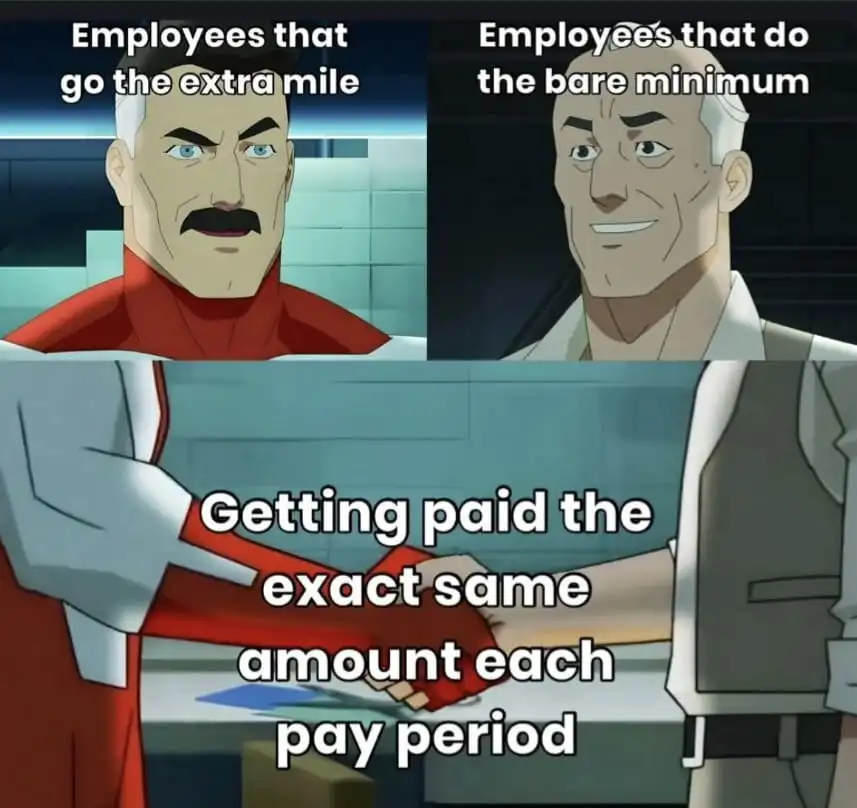this post was submitted on 04 Mar 2024
1258 points (98.7% liked)
Memes
52956 readers
855 users here now
Rules:
- Be civil and nice.
- Try not to excessively repost, as a rule of thumb, wait at least 2 months to do it if you have to.
founded 6 years ago
MODERATORS
you are viewing a single comment's thread
view the rest of the comments
view the rest of the comments

I get paid way more than my coworkers, and even my supervisor, because when I got hired I immediately made a bunch of random tools in google sheets that only I know how to maintain, and spread them around until everyone was using them. Before long, I was essential to my department, and praised for going "above and beyond" even though I was mostly just dicking around making the tools rather than doing my actual job.
I have 0 coding experience, so the tools are absolutely horrendous behind the scenes, but that just means that they break pretty often, and people are reminded that only I know how to fix them. So, when I went looking around on LinkedIn for other offers after a few years, I eventually got one that was paying way more since it was in a major metro area, and I took it back to my manager to negotiate a 50% raise and a full-remote designation that virtually nobody else in my office is given.
You don't get ahead by working hard, and you don't get ahead by working smart to benefit the company, you get ahead by working smart to benefit yourself. Think about it this way - if you're at the store to buy bananas, and you see that they're selling bananas for $0.05 ea, you'll likely think "Wow, that's a great deal!" and buy a bunch of those bananas at the $0.05 price. You're not going to pay them the price you think would be fair for a banana, you're going to take advantage of the price you're allowed to pay so that you can save money. Your employer sees you - working for less than you're worth - as a $0.05 banana. You're nothing more than a cheap commodity they were lucky to snag on sale.
Making yourself indispensable is a great way to never get promoted.
I turned down the promotion they offered me. It was significantly more work, required me to come back to the office, and only offered a 10% pay raise. It doesn't matter where your "standing" in the company is - if you're indispensable, you can fight for good pay even outside of managerial roles.
As long as you can get constant raises who cares about a promotion? If you got your job nailed down so much you only need to work like 5 hours a week and from home while getting raises I would turn down any promotion.
Promotion are almost always a trap. If you want a better job change companies!
It looks good on your resume when you apply for the next company, and that's how you keep getting raises in today's business environment.
It's one good thing to have on a resume, sure, but another is the skillset itself. For example, I work with a highly specialized software, so I frequently get messaged with interview offers on LinkedIn because I show up every time employers search for that specific software.
There is a bit too much "my situation fits all" here. Startup vs big corp, private vs government, thoughtful management vs not, etc. Other people will also recognize this mentality. Can't say "eat the rich" because they only do what's good for them, then do the same (yes, that's extreme).
You should benefit the company, and they should benefit you. I take your point to mean this equation should be balanced (which unfortunately it usually isn't), vs the specific words above.
That's a fair point. You're correct that my point is that the equation should be balanced, but you're understating the reality with the statement "unfortunately it usually isn't."
I put in 4 hours of work last week, though my employer thinks I put in 40. In those 4 hours of work I started and finished a project for the company that will earn over $100k in gross profit. It ended up being almost exactly 1.5x my yearly salary. Just by putting in the absolute minimum effort I'm already earning my company more in a week than they pay me in a year. And I don't even work for a large company. I'd imagine corporate giants have an even greater divide.
I'm not responsible for worrying about whether I benefit the company; most companies have gotten so good at maximizing profits while minimizing costs that even the most layabout worker earns them significantly more money than they cost to employ. My only thought is about how I can do as little as possible while still ensuring management continues to think I'm being productive.